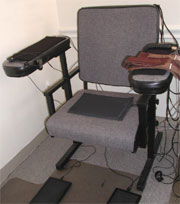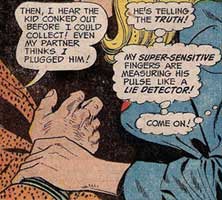
Typical polygraph chair, with the new external sensors that measure some other body reaction. Photo courtesy Aachen Polygraph Associates.
“I don’t know anything about polygraphs, and I don’t know how accurate they are, but I know they’ll scare the hell out of people.” – President Richard M. Nixon, whose paranoia helped establish the US Government polygraph program
Kristi looked up at me with surprise as I hit the door to the suite on the 8th floor of the anonymous office tower where we work.
It was late- nearly three PM, and my office was still dark. I had worked email from home in the morning, and did the staff meeting on the cell phone on the drive to the anonymous contractor-run facility. “Polygraph,” I growled. “It sucked.”
“Why did you come in?” she asked, the ringlets of her chestnut-brown hair swaying in wonder.
“I have some stuff to finish up, and then I am going to Willow and try to get the taste of anxiety out of my mouth,” I said.
“Did you pass?” she asked. It is a common enough question, and not insulting in the least at the notion that I was an undercover terrorist. A lot of people have problems with the voodoo science contained in the pressure cuff, sweat sensor and chest bands that measure respiration. That is why everyone I know hates the experience.
“It was the counter-intelligence version,” I said grimly, “So they didn’t ask about my boyfriends or drug abuse. Apparently I am not a spy. At least, not their spy.”
“Whoever they are,” said Kristi, and tossed her hair to one side.
“Yeah, hard to tell these days.” I walked on past the wall that separates her reception desk and the security log from the long corridor and into the cluttered space where I spend most of my day looking down at the intersection of Fairfax Drive and North Glebe and the thrusting spire of the proud white tower of Corporate HQ up the road.
I was drained. The brief feeling of relief at having passed the test- Bob kindly informed me that after he returned from The Place Polygraphers Go during break between sessions with the arm cuff puffed up tight and sweat sensor on the right hand and the tight bands around the chest.
I don’t now what they do while they are gone, or what the point of their departure might be. There is a fish-eye camera located in the ceiling of the anonymous white room. The sessions are always recorded, video and audio, of course, and there is nothing to look at in the painfully stark white room with plain gray carpet.
It is like North Korea, I reminded myself. They are watching, and listening. Don’t scratch your balls, keep your hands above your waist. Don’t get out of the square metal-framed chair. Do no whistle, or say anything out loud about how offensive and demeaning it is.
The career- what is left of it- is on the line and completely up to Bob. I tried to oxygenate my blood as best I could in the break, and avoid the temptation to get up, go over to Bob’s side of the desk and see what was on the screen of his computer. Everyone in the business has heard of classic melt-downs in the examination room. An examiner determined to unnerve a subject can use the machine as a sort of mental rubber hose, and induce panic and confession.
It is driven by the fear that the Polygrapher can use the evidence of the subjects own body to somehow peer into the soul and find something dark and shriveled and foul.
That is the theory, anyway, and it works. There are hundreds of people who came into the plain white rooms as patriotic citizens, and left the building Under Suspicion, stripped of their clearances and abruptly out of a job.
I glanced at my watch. It had been two-and-a-half hours of trying to remain utterly motionless as all the air was sucked out of my body. Sometimes they make you come back, so that you stew in your juices for a while.
I started in the chair as the door suddenly sprung open. I had been thinking about adjusting my underwear, but Bob was suddenly back into the stark white room from The Other Place. I suspect they may go out for a smoke break, or a quick drink from the office bottle. “You passed,” he said.
I sighed with relief as he unhooked me from The Box. “Thanks for the professionalism,” I said. “My last exam was conducted by the people from Langley, and the examiner was a lady who was a dead-ringer for my ex-wife’s attorney.”
“I don’t imagine it went well,” said Bob. “The kids- and by that I mean anyone under fifty- don’t understand how to read us Old Farts.”
“That is no shit,” I said, sliding my wallet into the back pocket of my Dockers and slipping the lanyard with my badges around my neck and shrugging into my sport coat. “Again, thanks for your time.”
“Just a job,” said Bob. Then his face hardened. “Now, you can’t talk about the portions of the device that have changed, since your last exam,” he gestured at the three external sensors on the black metal chair. “And do not discuss the control questions or the security ones. All tests are different and we don’t want people all ramped up for something when they come in to sit down.”
“Perfectly understandable,” I said. “Mum’s the word.”
Bob said there was an optional form I could fill out to provide my impression of the examination. I filled in the form on a clip-board at the front desk on the way out, praising Bob’s expertise. I refrained from saying what I thought about the process. The polygraph is more art than science, as is widely known, and actually used as a tool to get an admission of wrong-doing on the constantly-running tape.
It is a sort of rubber hose, used to extract confessions, and like the way Winston Smith felt Big Brother at the end of Orwell’s “1984,” the three hours in the white room left me filled with gratitude to Bob. I could keep my clearance. I had a job to go to tomorrow. There was a future.
That is such bullshit, I thought, as I walked out of the elevator and into the lovely light of the most perfect Fall Day. The only thing I really felt was that I wanted to go not to the office, but direct to Willow and start drinking Happy Hour White.
And the only thing I knew for sure was that this was the last goddamn time I am going on The Box.

(Supergirl uses her Superpowers to detect lies. Same general principle as the Ful-scope or Counterintelligence polygraph. Image courtesy DC Comics.)
Copyright 2011 Vic Socotra
www.vicsocora.com
